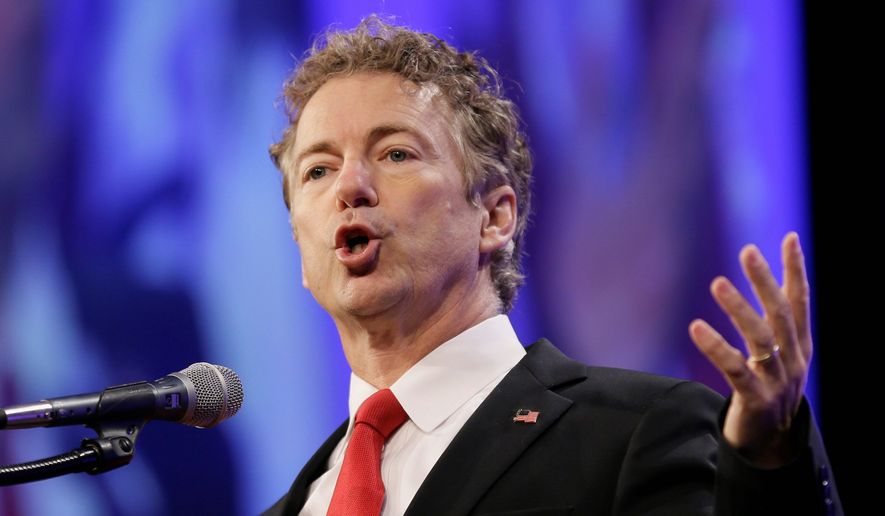Sen. Rand Paul said Wednesday that the “hawks” within his own Republican Party helped arm the Islamic State terrorists who are now threatening the U.S. and its interests in the region, reigniting a fierce GOP debate over the nation’s role in the world.
While other Republican presidential hopefuls have blamed the rise of the Islamic State on a destabilized region and a weak hand from President Obama, Mr. Paul, Kentucky’s junior senator and an announced presidential candidate, said most Americans think the U.S. helped create the problem by trying to be the world’s police.
“ISIS exists and grew stronger because of the hawks in our party who gave arms indiscriminately,” Mr. Paul said on MSNBC’s “Morning Joe,” using another name for the Islamic State. “And most of those arms were snatched up by ISIS.”
Mr. Paul also has argued that the war in Iraq generated more terrorist threats and less stability in the Middle East.
“So everything that they have talked about in foreign policy, they have been wrong about for 20 years, and yet they have somehow the gall to keep saying and pointing fingers otherwise,” he said.
Potential opponents said Mr. Paul’s comments show he is not ready to sit in the White House as commander in chief, in charge of keeping America secure.
“American weakness, not American strength, emboldens our enemies,” said Louisiana Gov. Bobby Jindal. “Sen. Paul’s illogical argument clouds a situation that should provide pure moral clarity.”
The hawkish wing of the Republican field could grow next week if Sen. Lindsey Graham of South Carolina enters the race, as expected. Mr. Graham, who sits on the Armed Services Committee and is a colonel in the Air Force Reserves, has been among the chief critics of the Obama administration’s Middle East policy and has called for a more forceful U.S. commitment to the region.
Mr. Paul insisted Wednesday that he is on the same page as ordinary Americans and that U.S. intervention is to blame for the rise of the Islamic State.
He also said the 2011 U.S.-led campaign to oust Moammar Gadhafi in Libya created a vacuum that strengthened the Islamic State and that the U.S. would have further emboldened the terrorists if it followed calls to attack Syrian President Bashar Assad’s regime.
His comments are reminiscent of the message on which his father, former congressman and three-time presidential candidate Ron Paul, ran on in his 2012 White House bid, blaming U.S. intervention in the area for the rise of Islamist terrorism and warning against Republican rhetoric on Iran’s nuclear weapons program, saying they just were eager to go to war.
“They want to do us harm because we are bombing them,” the elder Mr. Paul said in a debate in Iowa. “I think this wild goal to have another war in the name of defense is the dangerous thing. The danger is really us overreacting.”
Gordon Adams, a professor of U.S. foreign policy at American University, said the Paul family message has been a bitter pill to swallow for Republicans whose foreign policy vision is anchored in the “myth of American exceptionalism and leadership.”
“’We can’t shape the Middle East, and when we try to do so it goes bad for us.’ That is kind of what I hear Rand Paul saying,” Mr. Adams said.
Mr. Paul, he said, seems determined to pursue the fight in the policy arena by posing tough questions to voters.
“My impression is that Rand Paul takes the goal of convincing more people of this view of the world more seriously than his father did,” Mr. Adams said. “I think his father was more comfortable being a crank but did not project a desire of selling it to everyone. Rand Paul strikes me as someone who wants people to buy it.”
Mr. Paul, though, faces strong political and historical headwinds within the party, the professor said.
“He is the heir to a long string of minority Republicans who don’t see the United States as the global shaper, but that is not a majority within the party,” he said. “I daresay that has not been a majority view since the end of the Second World War.”
For the early part of the 20th century, it was the Democratic Party of Woodrow Wilson and Franklin D. Roosevelt that was more associated with intervention in foreign wars. The Republican Party provided the base of the “America First” movement that opposed U.S. involvement in World War II until the Japanese attack on Pearl Harbor mooted the debate.
Postwar Republican Presidents Eisenhower, Nixon, Reagan and the Bushes have almost entirely eschewed the “isolationist” label.
Indeed, a Wall Street Journal/NBC News poll released in March found that 79 percent of Republicans said they would rather have a candidate who backs intervention.
Mr. Paul said Wednesday that his policy approach resonates with voters outside Washington.
“The interesting thing is people want to paint me as out of step with the Republican Party, but when you get outside the Beltway and go to America, the rest of America, I think, is more in line with what I’m saying,” he said.
Paul spokesman Doug Stafford specifically rejected Mr. Jindal’s criticism, saying Mr. Paul “is the only Republican running, it seems, who is willing to learn from our mistakes in the Middle East in order to keep us safer and stronger.”
• Seth McLaughlin can be reached at smclaughlin@washingtontimes.com.




Please read our comment policy before commenting.